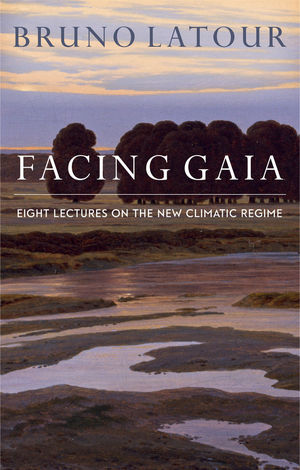Climate Katechon Politics: Carl Schmitt in Narratives of the Environmental Crisis
This paper explores the perplexing uptake of the legal-political thought of Carl Schmitt, a committed right-wing thinker, by left-wing scholars to address the ongoing environmental crisis. I argue that Schmitt's emphasis on the ontological equality of entities engaged in conflict is used as a framework by contemporary scholars like Bruno Latour¹,1 Latour, B. (2004). Politics of Nature: How to Bring the Sciences into Democracy. Translated by Catherine Porter. Cambridge, Mass.: Harvard University Press.²2 Latour, B. (2017). Facing Gaia: Eight lectures on the new climate regime. Polity: United Kingdom. to institutionalise the agentic equality between humans and the environment. Scholars like Latour attempt to use this equality to establish a novel political framework to seek emancipatory political solutions to the environmental crisis.
However, I argue that the attempts by scholars like Latour to appropriate Schmitt’s thought for such means ultimately ends in failure. Schmitt’s political thought cannot be divorced from the antagonistic teleology they originally served to legitimate and Schmitt’s own interpretation of Christian eschatology. Latour’s attempts to create an emancipatory political framework for the resolution of the environmental crisis through the political thought of Schmitt ends in failure because Schmitt’s thought is itself predicated upon the failure and political undesirability of such emancipatory frameworks in the first place. The use of Schmitt’s thought in the construction of such frameworks is a doomed project.
Instead, I propose that the logical conclusion of a faithful interpretation of Schmitt’s thought when applied to the environmental crisis leads to the Climate Katechon. Expanding on Mann and Wainwright’s³3 Wainwright, J. and Mann, G. (2020). Climate Leviathan: a Political Theory of Our Planetary Future. Verso. concept of the Climate Leviathan, Climate Katechon emerges through the incorporation of Schmitt’s critique of Hobbes’ Leviathan and the application of Schmitt’s postwar writings to the environmental crisis. Drawing on Schmitt’s work over the course of his entire life, Climate Katechon is a sketch of a highly authoritarian global authority with the sovereign power to end the environmental crisis through any means necessary. The development of Climate Katechon is not presented as a desirable outcome but rather as a theoretical exercise to illustrate why Schmitt’s thought ought not to be used to build emancipatory frameworks.
Further reading:

Facing Gaia: Eight Lectures on the New Climatic Regime
by Bruno Latour (2017)This book is based on a series of lectures where Latour engages with the figure of Gaia — drawn from the Gaia hypothesis by James Lovelock — which proposes that the Earth is a self-regulating, living system. However, Latour strips Gaia of any mystical or harmonious connotations, instead portraying it as a volatile, unpredictable force that defies human control.

Politics of Nature: How to Bring the Sciences into Democracy
by Bruno Latour (2004)In this book, Latour proposes a more inclusive, participatory model of democracy where scientific knowledge is not seen as objective and separate from society, but rather as something co-produced through collective deliberation. He suggests replacing the old dualism of nature vs. society with a new political system that integrates human and non-human actors (like animals, ecosystems, and technologies) into decision-making processes.

Climate Leviathan: A Political Theory of Our Planetary Future
by Geoff Mann and Joel Wainwright (2020)This book explores how climate change could reshape global politics and power structures. It argues that the climate crisis will likely lead to the rise of a new global sovereignty — a kind of authoritarian world government (the "Climate Leviathan") — to enforce carbon regulations and manage the planetary emergency.